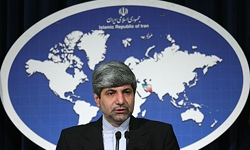|
Iranian Foreign Ministry Spokesman Ramin Mehman-Parast lashed out at the US for its aggressive foreign policy, and said the US public diplomacy which is based on military aggression and spreading Islamophobia and Iranophobia among the world countries pursues a clash of civilizations. |
 "Clash of civilizations is the main pivot of the US public diplomacy," Mehman-Parast said, addressing a number of students and researchers in Tehran on Sunday.
"Clash of civilizations is the main pivot of the US public diplomacy," Mehman-Parast said, addressing a number of students and researchers in Tehran on Sunday.
"The American public diplomacy impairs the other side's reputation to attain its goals," he said, and added that the United States' Islamophobia and Iranophobia projects are meant to serve the same goal.
Mehman-Parast also described the US support for terrorist groups across the world, including the anti-Iran terrorist Mojahedin-e Khalq Organization (MKO) and Jundollah, as yet another indication of Washington's belligerent and aggressive foreign policy, which he said aims to exert pressure on independent countries like Iran.
Many analysts believe that the US is seeking to defeat its adversaries through various illegitimate means, including training and supporting terrorist groups. Washington has funded, reorganized and backed up several terrorist organizations along Iran's borders in the last three decades.
Iran, located at the crossroad of international drug smuggling from Afghanistan to Europe, has taken new security measures in its border provinces following several attacks by terrorists and drug traffickers at its Eastern and Western borders.
A majority of insecurities at Iran's Eastern borders pertain to the operations conducted by the terrorist Jundollah group in recent years, but after Iran arrested a large number of its members and hanged its leaders, the US-backed group was dismantled.
Jundollah is the main terrorist cell operating in Southeastern Iran. Tehran has arrested a majority of its members and executed its number one and number two men.
After Iran arrested Abdolmalek Rigi, the ringleader of Jundollah, in late February, the criminal ringleader confessed that he was traveling to Bishkek to meet with a high-ranking US official at a nearby military base to discuss new terrorist attacks on Iranian territory. Rigi was executed in June.
But in November 2011, Iran's Police Chief Brigadier General Esmayeel Ahmadi Moqaddam warned that Washington and London are trying to revive Jundollah after the group lost most of its power due to the strong measures adopted by the Iranian Police.
"These services have spent a great amount of money on Rigi's group as they feel compelled to make efforts to revive and reorganize it," Ahmadi Moqaddam said at the time.
"If the terror group still lacks the intended capability, they will engineer another group since they seek to harm our Islamic system and create rifts among Sunni and Shiite followers," he noted.
Meantime, the Iranian police chief said that the Iranian security and police forces have inflicted serious harm on the terrorist group and the group has lost many of its members.
The Jundollah group has claimed responsibility for numerous terrorist attacks in Iran. The group has carried out mass murder, armed robbery, kidnapping, acts of sabotage and bombings. They have targeted civilians and government officials as well as all ranks of Iran's military.
In one of the worst cases, the terrorist group killed 22 citizens and abducted 7 more in the Tasouki region on a road linking the southeastern city of Zahedan to another provincial town.
In 2007, Jundollah kidnapped 30 people in the Sistan and Balouchestan province and took them to the neighboring Pakistan.
Jundollah claimed responsibility the same year for an attack on an Islamic Revolution Guards Corps (IRGC) bus in which 11 IRGC personnel were killed.
In another crime in October 2009, the Pakistan-based terrorist Jundollah group claimed responsibility for a deadly attack in the Sistan and Balouchestan province which killed 42 people among them a group of senior military commanders, including Lieutenant Commander of the IRGC Ground Force Brigadier General Nourali Shoushtari.
